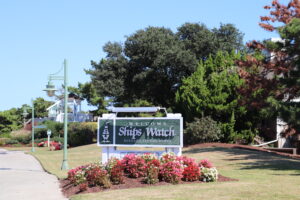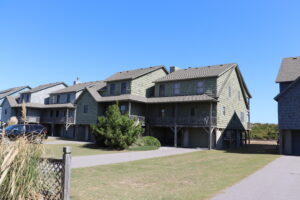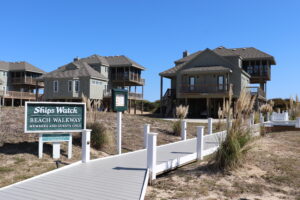 Co-ownership homes on the Outer Banks became popular in the 1980’s. A co-ownership home is not a time-share property. Most Outer Banks co-ownership properties (sometimes called fractional ownership), give a buyer one tenth possession of the home. It’s possible to purchase more than one tenth and some owners do. The other owners could be your friends and relatives. But in most cases, it is other folks who love the Outer Banks as much as you. Each year you’ll have five weeks to use the property any way you’d like. For example, you could rent a couple of those weeks or you could use it all five of those weeks. There is a schedule put together where each of the ten owners receive five weeks (segments), in the house each year. Each year you receive a different five- week segment. Those segments include possession of the property during each season of the year. The last two weeks of the year are used for maintenance.
Co-ownership homes on the Outer Banks became popular in the 1980’s. A co-ownership home is not a time-share property. Most Outer Banks co-ownership properties (sometimes called fractional ownership), give a buyer one tenth possession of the home. It’s possible to purchase more than one tenth and some owners do. The other owners could be your friends and relatives. But in most cases, it is other folks who love the Outer Banks as much as you. Each year you’ll have five weeks to use the property any way you’d like. For example, you could rent a couple of those weeks or you could use it all five of those weeks. There is a schedule put together where each of the ten owners receive five weeks (segments), in the house each year. Each year you receive a different five- week segment. Those segments include possession of the property during each season of the year. The last two weeks of the year are used for maintenance.
Legal Ownership
When you purchase one of these properties you actually will get a deed that is recorded in the courthouse. That deed will say that you have one tenth ownership and that the property is bound by certain covenants and restrictions. Most times, there is a management firm that maintains the homes on Fridays between owners. Check out time is usually around 10 AM and check in time is usually around 4 PM. The house is cleaned and maintaned between those times.
POSITIVES
This is a less expensive way to own a piece of the Outer Banks. This type of property allows a buyer to purchase a portion of an ocean front home for less than six figures. If you have to have ocean front but don’t want to spend the money for a condominium or a single family residence then this might be the best answer for you. For people who love the Outer Banks but have busy lives elsewhere, five weeks at the co-ownership property is plenty. If you can plan your vacations ahead of time then this type of ownership works pretty well. It’s also possible to trade weeks with other owners. Another advantage of owning a co-ownership property is that you don’t have to complete the maintenance. You’ll still pay your share of it but that work will be done by the appropriate vendor.
Negatives
Some of the negatives of co-ownership are that a majority of the owners have to agree to make updates. Occasionally I’ll see a co-ownership property that looks like it did 30 years ago. That’s because the majority of the owners have decided not to put any additional money in the property. Similar to a condominium, a co-ownership property may have rules about pets. If you want to take your pets with you to the beach, then make sure the rules allow you to do that. Usually the maintenance fees are rather high as well. That’s because besides paying for the taxes, insurance and maintenance for the property, you also pay for management of the property. That can be a two-edged sword. Many people don’t want to worry about maintenance when they are here. Co-ownership properties rarely qualify for conventional mortgages. Most people who purchase these properties either pay with cash or take the equity out of their primary residence. Over the years I’ve found that they don’t appreciate as quickly as full ownership properties as well. If you don’t want to share ownership, then you may start your Outer Banks search here.
 Co-ownership properties are a good solution to inexpensive ocean front ownership. These co-ownership segments can range from less than $50,000 to well over $100,000 for that one-tenth ownership. Here’s a link to available co-ownership homes on the Outer Banks. Please feel free to contact Scott Team Realty to learn which co-ownerships are currently available and for more information about any Outer Banks property.
Co-ownership properties are a good solution to inexpensive ocean front ownership. These co-ownership segments can range from less than $50,000 to well over $100,000 for that one-tenth ownership. Here’s a link to available co-ownership homes on the Outer Banks. Please feel free to contact Scott Team Realty to learn which co-ownerships are currently available and for more information about any Outer Banks property.








can you rent your share of co ownership if all others disagree 1-10 split
Thanks for the question George. My first thought on this is that you could rent out your week as long as there was nothing in the covenants and restrictions forbidding that. Of course, if the covenants and restrictions don’t prevent it but nine of ten owners don’t want to rent, then those nine owners could vote to change the covenants and restrictions to forbid weekly rentals. Assuming you want to pursue one of these, you may want to get a copy of the covenants and restrictions as well as the bylaws. Please note, for a definitive answer it is probably a good idea to run this question by a North Carolina attorney. If we can help you with that or would like us to help you get the documents for this Outer Banks co-ownership, then please feel free to contact Scott Team Realty.
Are the five weeks divided in such a way as to give each co owner a week in the summer?
Not all co-ownership properties are the same but most offer at least one week in the summer for the ten owners. Thanks for the question. Please feel free to call on us for anything on the Outer Banks.